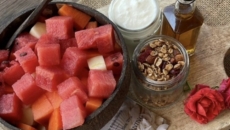It's not always simple to estimate how much food you'll actually consume when cooking. especially if you're cooking for a larger group. You will undoubtedly have some leftovers the following day if you think that having too much food is preferable to having not enough. Therefore, if you intend to store them, keep them in the refrigerator to prevent the growth of bacteria that could become dangerous to your health.
But hold on, have you ever questioned whether the food you are reheating is still ediblet? Well, given that they frequently lose their nutritional content when reheated, several of the foods we eat on a daily basis might not be as safe.
And as long as you are aware of which items you should never reheat, that isn't necessarily a negative thing.
SEAFOOD
Fresh seafood usually tastes better than frozen seafood. But given that this preservation method is more tightly regulated by food safety organisations, purchasing it frozen may be safer.
But what should you do if you prepare a gourmet meal, like seafood paella, and there is simply too much to eat? Once more, as soon as it has slightly cooled off, place it in a refrigerator.
RICE
The same is true of rice, another common component of dinner. You can safely reheat the dinner the following day if you store it in the refrigerator as soon as it has cooled off a bit. If you don't and leave it out on the counter for too long, the Bacillus cereus bacteria may begin to grow.
SPINACH
Even the best foods can turn toxic if they are prepared improperly. When consumed raw, spinach is tasty and incredibly nourishing. But when softly melted over oil in a pan, it creates a really lovely side dish or even a beautiful sauce.
You shouldn't subject it to heat again after the first time. Use any leftovers in a salad or simply consume them cold. Nitrates are abundant in spinach, and when they are heated to a high temperature, they can transform into nitrosamines, the majority of which are carcinogenic.
EGGS
We all know that eggs are a great source of protein, but repeatedly heating fried or boiled eggs can be dangerous. Eat fried eggs right away, but if they've been kept for a while, don't reheat them; instead, just eat them cold because high-protein foods contain a lot of nitrogen. Reheating could cause this nitrogen to oxidise, which would then cause cancer.
BEETROOT
Beet-containing cooked meals also fall under the category of foods that shouldn't be heated up again. The narrative is same to that of the spinach.
You run the risk of receiving a dose of toxins instead of all the wonderful advantages of this vegetable in its raw or lightly cooked form if you put the leftover beetroot stew or curry in the oven, microwave or hob.
MUSHROOM
White and brown button mushrooms, for example, may be okay to eat raw, but the majority of the other mushrooms should absolutely be cooked. Again, the next day, you absolutely should not microwave them. Unless you put it in the fridge quickly enough after cooking.
Mushroom proteins can be harmed by enzymes and bacteria that begin to grow at room temperature if they are not stored appropriately. An unpleasant stomach may result from this.
CHICKEN
You already know how delicious hot chicken is, but if you are preserving the curry for the next day, remember not to reheat it constantly. When this staple is heated from the refrigerator, its protein makeup is completely altered. The digestive system may experience issues as a result. Be careful not to heat it at a high temperature.
POTATOES
Have you ever noticed how poorly leftover cooked potatoes taste? Maybe you haven't since the flavour would merely blend in if you fried them again in a skillet or heated them along with other dishes. But if you give it a shot, I'm confident that you'll never want to eat leftover potatoes again.
Long-term room temperature storage of cooked potatoes can result in the growth of clostridium botulinum bacteria. Eating food contaminated with this bacteria can have very serious implications.






